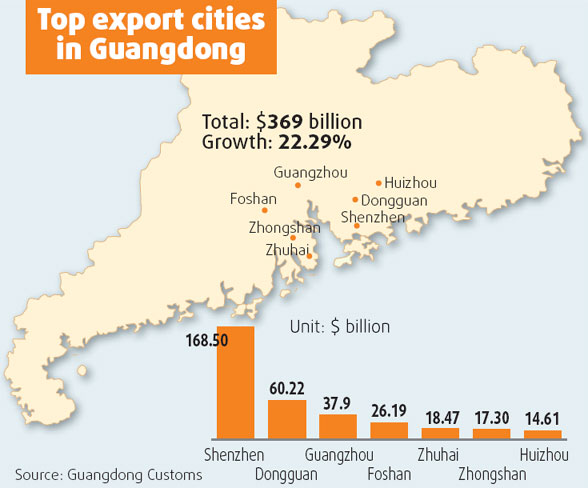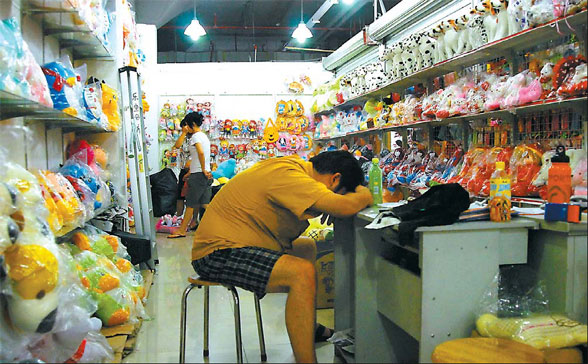Factories fold in changing PRD climate
|
A stallholder takes a nap at a toy wholesale market in Shenzhen. Shenzhen produces 40 percent of the world's toys. File photo |
SHENZHEN: It's a busy time for He Yunlong, a lawyer at the Guangdong Qifeng Law Office in Pearl River Delta (PRD) city Dongguan.
Since the second half of last year, he's been swamped with phone calls from angry employees and suppliers wanting to sue factory owners who have fled, as the region's manufacturers come under increased pressure.
A Taiwanese boss abandoned his shoe factory in Dongguan's Houjie town on the Sunday before Spring Festival in February, leaving 1,000 employees in the lurch. More than 20 million yuan is owing in unpaid wages, supplier payments and utility bills.
That's one of many cases, according to a report in Business Watch magazine, which cited insiders as saying local private investors are also walking away from factories in the region.
The local government usually compensates workers in such cases, and equipment and other factory assets are sold at auction. But suppliers typically lose out, the magazine reported.
Media reports estimate some 6,000 to 7,000 Hong Kong-backed companies will close in the PRD area this year.
Most companies that have moved from the area are small- and medium-sized enterprises in labor-intensive manufacturing industries including hardware, toys, garments, shoes and plastics, according to a survey by Guangdong's department of foreign trade and economic cooperation.
More than 90 percent of those SMEs are Hong Kong- or Taiwan-backed.
The department estimates about 1.2 billion yuan in sales and 13,000 workers have been affected by manufacturers' relocating.
Huang Huahua, governor of Guangdong, told reporters in March that only 244 companies shifted from the PRD area in 2007, while more than 7,000 moved in.
"It's normal for some companies to move out or close while some manufacturers move in," he said.
But he said an industry upgrade looms and the Guangdong and Hong Kong governments have set up a special team for transfers in the PRD area to help foreign-funded companies and processing firms.
"We will encourage PRD firms to transfer to the mountainous areas of Guangdong as well as to the east and west of the province," Huang said.
"The government plans to issue a new policy soon to provide cheap power in these areas to encourage labor-intensive industry to make the shift," he said, adding that processing companies are being encouraged to develop domestic markets that were previously out of reach.
Staying afloat
Manufacturers are also trying to find ways to survive in the tougher environment.
"We have to face the problems. Many members plan to move to inland cities with more space and cheap labor - or to Southeast Asian countries like Vietnam. But they won't close their PRD factories just yet," Andrew Yeh, chairman of the Taiwanese Businesses Association in Dongguan, said.
Lower export rebates, fewer preferential policies for processors, the appreciating yuan, rising raw material and labor costs, tight land supply and more stringent environmental and labor protection rules amount to a major headache for factories in the area.
More Dongguan manufacturers are looking to the domestic market, while 56 companies were on the waiting list to go public and raise capital at the end of March.
The Dongguan government has called on local firms to "transform and grow with us", promising 1 billion yuan a year to support research and development and brand building.
But any "pain" generated from the upgrade is temporary and should be seen as positive progress toward a healthier economy, analysts said.
'Better choices'
"Companies will feel unprecedented pressure and anxiety about the changing situation, but they should realize they can make better choices now," Ding Li, a researcher at the Guangdong Academy of Social Sciences, said.
"Manufacturers should focus on research and development at the higher end of the industry chain and creating brands at the lower end," the researcher said.
Globalization of manufacturing means finding the production bases with the lowest costs - and the Pearl River Delta has succeeded in grasping that opportunity over the past decades, Ding said. "But now our costs are rising too and we need to be more competitive."
The PRD's business environment has improved and continues to be competitive, surveys show.
Actual foreign investment in the area's nine cities saw a year-on-year increase of 15.4 percent in 2006, and that figure jumped to 16.1 percent last year, according to official data.
In Shenzhen, the top export city in the province, about 70 percent of new investment went to the tertiary and industrial service industries last year.

(China Daily 04/15/2008 page40)















